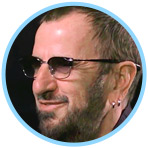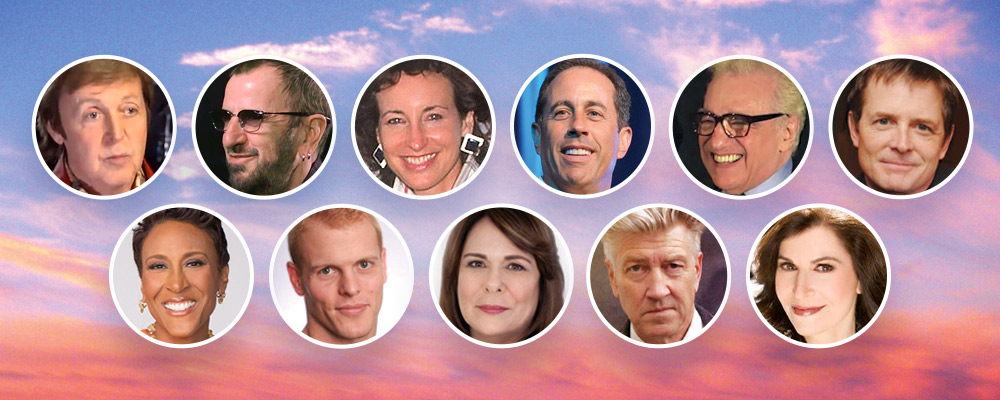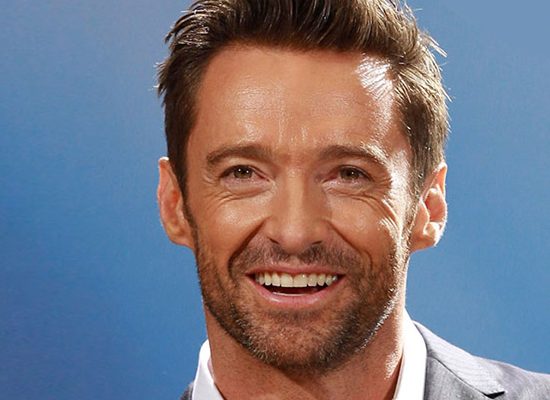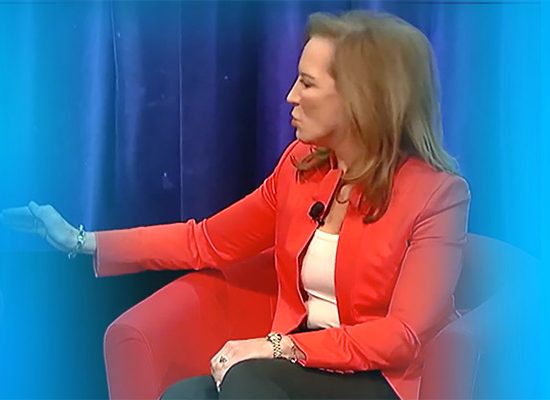“True icons are larger than life, unforgettable with an elegance that’s mesmerizingly timeless.” —Francois Nars, fashion photographer
This can be said of only a few artists and public figures in anyone’s lifetime. Achieving such an extraordinary level of success is difficult; sustaining it for years on end is almost impossible. Yet today we are blessed to share the planet with some of the most creative people in their fields, people who truly deserve the title of Icon.
What may surprise you is that many of these iconic figures attribute part of their success to their regular practice of the Transcendental Meditation® (TM®) technique, which, they say, helps them sustain their creativity, energy, and resilience to practice their craft and still stay fresh and new.
While millions of ordinary people from all walks of life—and of every religion, nationality, level of education, and age—have learned TM and report great benefits, we want to take a moment to feature a few iconic figures and their reflections on how practicing TM has contributed to their remarkable achievements.
 Creative Intelligence and Spiritual Grounding
Creative Intelligence and Spiritual Grounding
Brenda Boozer spent 14 seasons as a soloist at the Metropolitan Opera in New York and has performed with the world’s most prestigious opera companies, including the Paris Opera, Covent Garden in London, Lyric Opera of Chicago, San Francisco Opera, and the Frankfurt Opera House in Germany.
As a dancer Boozer studied with Martha Graham, and as an actress she studied with Katharine Hepburn and Herbert Berghof of the Actors Studio. Currently, she sings, performs, and teaches voice to private students in New York City, Westchester, and Boone, North Carolina.
“There is so much demand on performers,” she says. “There has to be a spiritual grounding not to be affected by fashion or criticism. Only an inward journey could bring this steadiness. TM practice helps with clarity of mind and a restful alertness that allows a creative intelligence. Each of us is given a life force. It is an enormous gift, as well as a responsibility. This embodiment carries our spirit as well as our transcendence.
“Meditation heals the very core of your being and allows self-healing. Then you’re coming from a healed, whole place of light. When you meditate twice a day, you start to feel that every area of your life changes in a beautiful way—there’s more kindness, more patience, more love.” For more, see this Enjoy TM News interview ►
 Clarity in the Midst of Conflict
Clarity in the Midst of Conflict
Candy Crowley, the renowned chief political journalist and five-year host of CNN’s State of the Union, in hosting the debate between President Barack Obama and Governor Mitt Romney in October 2012, was the second woman to host a presidential debate and the first in two decades to do so.
In the highly charged world of political coverage, she counted on her daily TM practice for stress-relief, energy, and inner calm. As she told the New York Times, “I practice Transcendental Meditation. I’ll do it in the morning. If I have to, I do it at the office. Most times, I will do it when I get home, but not before bed, because it tends to be energizing.”
In 27 years at CNN, Crowley interviewed the top political newsmakers of the time, from Vice President Joe Biden, Secretary of State John Kerry, and House Minority Leader Nancy Pelosi, to former Secretary of State Hillary Clinton and former President George W. Bush, among many others. Navigating the complex political conflicts of the day was challenging, to say the least, but Crowley’s TM practice helped, as she told the Washington Post: “It’s a hard thing to describe, but I find that my thought is clearer. I still get mad. I still get upset. But I let it go more quickly.” Read more on Crowley here ►
 Channeling Your Drive to What Matters Most
Channeling Your Drive to What Matters Most
Tim Ferriss, best-selling author of The 4-Hour Work Week, entrepreneur, and public speaker, interviewed more than 200 executives, leaders, and others at the height of their fields for his book, Tools of Titans: The Tactics, Routines, and Habits of Billionaires, Icons, and World-Class Performers. He discovered that 80 percent use daily meditation, including TM.
For Ferriss, Transcendental Meditation is the practice that works for him. He views it as a “meta-skill” that helps him be a “commander” on the battlefield of life. As he writes of learning TM in Tools of Titans, “I was afraid of ‘losing my edge,’ as if meditation would make me less aggressive or driven. That was unfounded; meditation simply helps you channel drive toward the few things that matter, rather than every moving target and imaginary opponent that pops up.”
 Achieving Stillness
Achieving Stillness
Michael J. Fox, beloved film and television actor, author, producer, and activist, began his outstanding career in the 70s and achieved superstardom in the 80s and 90s for his roles in highly popular series like Family Ties and Spin City and the Back to the Future film trilogy, among others. Despite developing Parkinson’s Disease, he continues to work in film and television, with three Emmy nominations for his recurring role in The Good Wife, and guest roles and cameos in other popular series.
In addition to his work as an in-demand actor and bestselling author, he is an indomitable champion for people living with the illness through the Michael J. Fox Foundation for Parkinson’s Research, which is dedicated to finding a cure. He has received numerous humanitarian awards for this work, including a Global Health Award from the David Lynch FoundationSM.
How has he maintained this level of accomplishment despite his disease? One technique in his tool box is Transcendental Meditation, which allows him to achieve a stillness while awake that’s otherwise available to him only in sleep. As he explained to Haute Living, “The only way I don’t move, in even the subtlest ways, is when I’m sleeping. The brain activity is to a point where you’re not moving… I don’t shift in my sleep. If I shift, I’m awake. I’m the same way when I do meditation. If I do it sincerely, then my brain slows down enough that my body gets still.”
 Inspiring Heights of Creativity
Inspiring Heights of Creativity
Sharon Isbin is considered the leading classical guitarist of our time. Among her many honors, she was named “Best Classical Guitarist” by Guitar Player magazine, and is the first guitarist in over 40 years to receive two classical Grammy Awards, in 2001 and 2010.
Isbin was a student of Andrés Segovia and a graduate of Yale University. She heads the guitar department at the Aspen Music Festival and The Juilliard School, and has performed to sold-out audiences around the world—from Carnegie Hall to London’s Barbican to the White House. At every step of her incredible career, Isbin has practiced TM, which she started when she was 17.
“Practicing TM has inspired heights of creativity for me on many levels: as a musician, arranger, educator, writer, and artistic director. Because TM is so effective at eliminating stress and distraction, it encourages laser-sharp focus and concentration for any task.
“As a musician, TM enhances my mental stamina, memory, concentration, and ability to learn. It puts me in touch with my innermost creative core and enables its expression through music. Most importantly, it facilitates instant access to a state of ‘cosmic immersion’— that feeling of being in the flow, or ‘in the zone.’
“When I perform onstage, I enter a state of being very similar to the one I enter daily when practicing TM. It’s a sense of communion with the energy of the universe, the audience, the composer, and the music—without ego or interference. It’s a feeling of unity between me and the listeners, a sense of oneness in which we are all experiencing the beauty of the music together.” Read more of Isbin’s insightful interview ►
 Unlimited Reserves of Energy, Creativity, and Happiness
Unlimited Reserves of Energy, Creativity, and Happiness
David Lynch, film director, screenwriter, producer, painter, musician, and photographer, has been called “the most important director of this era” by The Guardian. Critics widely consider his films Blue Velvet and Mulholland Drive to be the greatest films of their decades. He won Best Director for Mulholland Drive at the Cannes Film Festival, and he received Best Director Academy Award nominations for both films, as he did for The Elephant Man. His Emmy-nominated TV series Twin Peaks forever changed the course of television, and will continue on Showtime in May.
For this “Renaissance man of modern American filmmaking,” TM has been a source of creative renewal for decades. Lynch evocatively describes the immense creative benefits he has derived from his practice in his book Catching the Big Fish: Meditation, Consciousness, and Creativity.
But Lynch isn’t content to reap these benefits for his creative life alone; he wants to bring them to at-risk children and adults everywhere. “Stress is like a vise grip on the creativity of young people,” he says. “Give them a tool to reduce their stress and wake up their brain, and there’s no limit to what they can create.”
To achieve this goal, he founded the David Lynch Foundation, and recently received the prestigious Smithsonian American Ingenuity Award for bringing TM to 500,000 under-served children. He sums up his mission at DavidLynchFoundation.org.
“I started Transcendental Meditation in 1973 and have not missed a single meditation ever since. Twice a day, every day. It has given me effortless access to unlimited reserves of energy, creativity, and happiness deep within. This level of life is sometimes called ‘pure consciousness’—it is a treasury. And this level of life is deep within us all.
“But I had no idea how powerful and profound this technique could be until I saw firsthand how it was being practiced by young children in inner-city schools, veterans who suffer the living hell of post-traumatic stress disorder, and women and girls who are victims of terrible violence.
“TM is, in a word, life-changing for the good.
“In 2005, we started the David Lynch Foundation for Consciousness-Based Education and World Peace to ensure that every child anywhere in the world who wanted to learn to meditate could do so. Now, the Foundation is actively teaching TM to adults and children in countries everywhere.”
 Serenity in Moments of Madness
Serenity in Moments of Madness
Sir Paul McCartney, singer-songwriter, musician, composer, and founding member of the Beatles—widely considered the most popular and influential group in the history of pop music—and later Wings, is legendary for his songwriting, both solo and in collaboration with fellow Beatle John Lennon. McCartney is a 21-time Grammy Award winner, two-time Rock and Roll Hall of Fame inductee, and 32 of his songs have reached number one on Billboard. Over 2,200 artists have covered his Beatles song “Yesterday.”
McCartney and the Beatles met Maharishi Mahesh Yogi in London in 1967, and soon went on to learn Transcendental Meditation in North Wales. In 1968 the Beatles attended an advanced TM training course with Maharishi in Rishikesh, India, a particularly productive time for them all—many of their songs there were recorded for “the White Album” and Abbey Road, as well as solo projects. Through their music and TM practice, the Beatles were instrumental in popularizing TM in the Sixties.
In 2009 McCartney and Ringo Starr reunited on stage for the first time at the star-studded David Lynch Foundation benefit concert “Change Begins Within,” to bring TM to at-risk children around the world. At the time, McCartney spoke with film director and philanthropist David Lynch about his TM practice. Watch McCartney and Lynch here. Find more on the TM Blog ►
“In moments of madness, meditation has helped me find moments of serenity—and I would like to think that it would help provide young people a quiet haven in a not-so-quiet world… It was a great gift that Maharishi gave us… For me it came at a time when we were looking for something to stabilize us towards the end of the crazy Sixties… It’s a lifelong gift; something you can call on at any time.” Read more in this CNN article ►

TM as the Missing Component
Robin Roberts is one of the most successful broadcasters in television and has been co-anchor of ABC’s Good Morning America since 2005. Under her leadership, GMA has won four Emmys for Outstanding Morning Program and the People’s Choice Award for Favorite Daytime TV Hosting Team. In 2014, Roberts was honored with the Walter Cronkite Award for Excellence in Journalism, and named one of Glamour’s Women of the Year.
In 2007 Roberts was diagnosed with breast cancer and then, five years later, with Myelodysplastic Syndromes (MDS), a group of diverse bone-marrow disorders. Her story triggered an outpouring of support from across the nation. After undergoing a bone-marrow transplant from her sister, Roberts joined forces with Be the Match, a bone-marrow registry that has seen a tremendous increase due to her efforts. Her battle has been honored by the Susan G. Komen Foundation and the Arthur Ashe Courage Award, among others, and this May, the David Lynch Foundation will give her one of its Humanitarian Awards for strength and vision.
For Roberts, TM has played a vital role in her recovery after she was diagnosed with MDS. “When I had strike two, I thought, I need to do something else… I wanted something more. I had already been taking care of myself physically—played basketball and tennis, ate healthy and did not smoke, drank in moderation, but there was one component that was missing, and TM has been tremendous, just tremendous in my recovery… It will not prevent you from the things that are going to come your way, but boy does it really help you in the recovery process.”
Watch Roberts and other powerful women in the media who practice TM
 “That 20-25 Minutes Is a Godsend”
“That 20-25 Minutes Is a Godsend”
Martin Scorsese, the director, producer, screenwriter, and film historian whose career spans more than 50 years, has directed some of the most iconic films in cinema—from Mean Streets to Gangs of New York and The Wolf of Wall Street. He won an Academy Award for Best Director for The Departed and has received eight Academy Award nominations for Best Director, more than any living director. The American Film Institute includes three of his films—Taxi Driver, Raging Bull, and Goodfellas—on its list of 100 Greatest American Movies.
Scorsese has been meditating every day since 2008. “There’s a kind of a peacefulness that I don’t think I’ve ever achieved before. And it has made a major difference, particularly in the morning. Because the amount of things that have to be done, the things you have to worry about, suddenly it just comes together. You stop. I find that I can’t do without it. Literally.”
His TM practice was vital while directing and co-producing Hugo, his first 3D film, which was nominated for 11 Academy Awards in 2011, including Best Picture, and won 5: for Best Cinematography, Art Direction, Sound Mixing, Sound Editing, and Visual Effects.
Shooting a historical adventure in 3D was a whole new challenge for Scorsese. “I would get up 45 minutes early to meditate before I was able to face that set! With child actors who can only work for like a minute, a dog who doesn’t listen, Sacha Baron Cohen who was improvising everything, and everything in 3D, and over-schedule and over-budget! God, there’s only one thing you can do—calm it down, and get into it, and deal with the realities… That 20-25 minutes is a godsend.”
Watch Martin Scorsese with Ray Dalio, founder of Bridgewater Associates hedge fund
 A Charger for Your Body and Mind
A Charger for Your Body and Mind
Jerry Seinfeld—comedian, actor, producer, director—co-created a TV classic for the ages with Seinfeld, his Emmy-award-winning series. The show lives on in syndication while Seinfeld continues creating new comedic ventures, with series like The Marriage Rep and Comedians in Cars Getting Coffee, or voicing The Bee Movie, and touring the nation performing his quintessential observational stand-up comedy.
Through it all, for 45 years, Seinfeld has been practicing TM, which he credits with his creative stamina.
“With Seinfeld, I was doing a TV series in which I was the star of the show, the executive producer of the show, the head writer, in charge of casting and editing, for 24 episodes on network television—not cable—for nine years! And I’m just a normal guy. And that was not a normal situation to be in… So I meditated every day. And that’s how I survived the nine years.
“But it’s very hard to explain… Do you know how I was describing TM to somebody? It’s like having… You know, your phone has a charger, right? It’s like having a charger for your whole body and mind. That’s what Transcendental Meditation is!”
Listen to Seinfeld’s amusing interview with the David Lynch Foundation’s Bob Roth
And don’t miss “Seinfeld on Drones, TM, and Messy Beds”
 A Whole New Way of Being
A Whole New Way of Being
Ringo Starr, musician, singer, songwriter, actor, and member of the Beatles, is considered one of the greatest drummers of all time and is recognized for the compositional power of his percussion. He is among the few musicians twice inducted into the Rock and Roll Hall of Fame, both as a Beatle and a solo artist, and is also in the Modern Drummer Hall of Fame. Since 1989 he has led Ringo Starr & His All-Starr Band on tour and in the studio, while participating in numerous creative and humanitarian projects.
Along with his Beatles bandmates, Starr started TM in 1967, after a life-changing meeting with Maharishi. “When I first met Maharishi, it was one of those mind-altering moments of your life, because the man was so full of joy and happiness. It just blew me away. On my best day, I never felt like he looked. I wanted some of that. It was the best thing that could happen.”
An avid meditator, Starr describes his practice with lyrical brevity. “With meditation you learn to relax—it’s a whole new way of being. It’s all very simple; it’s not way-out there. You just go with it.”
In recognition of Starr’s lifelong dedication to peace through his music and humanitarian work, the David Lynch Foundation honored him with its Lifetime of Peace and Love Award. In 2014 Starr also launched the Ringo Starr Peace and Love Fund to heal trauma and stress through Transcendental Meditation.
And we can’t think of a better way to end this tribute to icons in media and the performing arts than with highlights from the first-ever concert reunion of Ringo Starr and Paul McCartney, performing at the DLF “Change Begins Within” benefit at Radio City Music Hall.





I’ve done TM since 1974 and have been a PTSD sufferer all my life. TM and CIC 1984 helped me considerably to have the clarity to understand and grow as an artist. I couldn’t live without it.
Thanks for sharing your experience, Hans, which you put so well. All best wishes in life and work, and let me know if you’d be interesting in sharing your story with our readers.
As a teacher of the TM technique since 1974, my life is taking all the right turns and bringing me increasing happiness with every step.